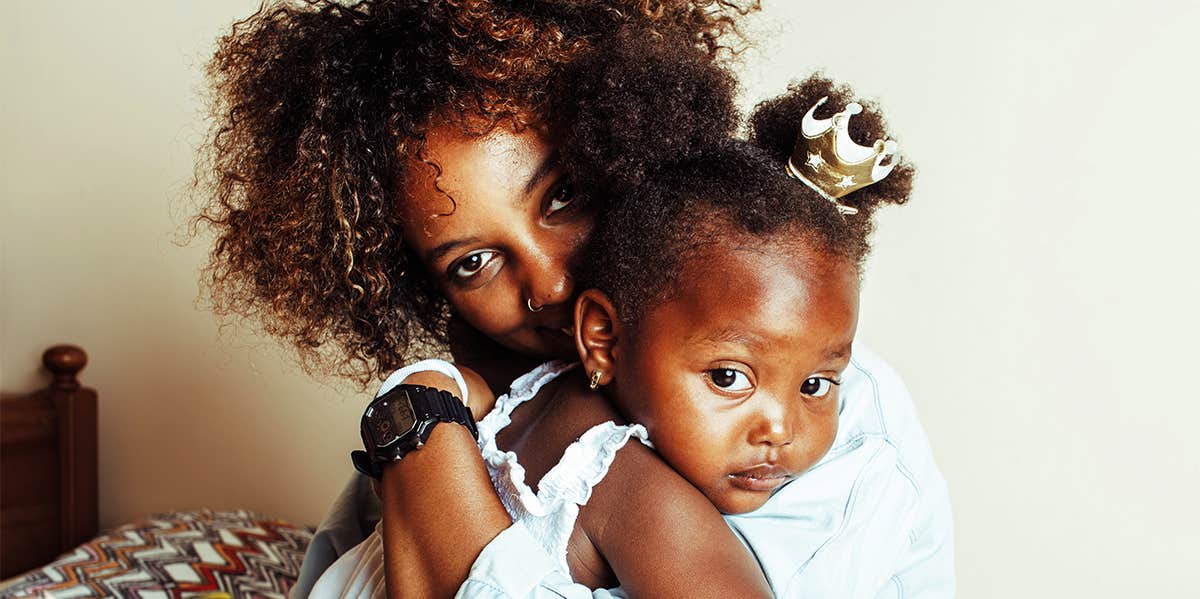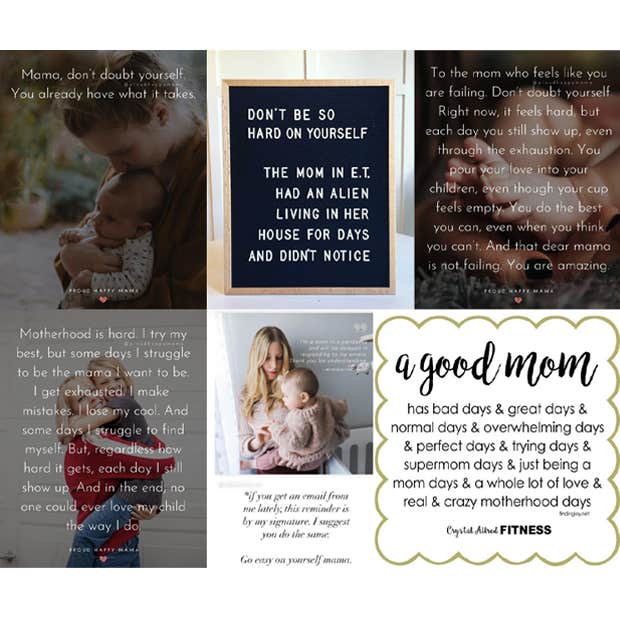“Go Easy On Yourself, Mama,” Is White Privilege At Its Peak
As a white mother, I am not held to the same standard that a woman of color is held to.
 yonikamoto / Shutterstock
yonikamoto / Shutterstock There’s a pervasive genre of meme on the mommy internet. I remember it from the mommy blogging days back in the mid-00s and I see it pop up every couple of days in my social feeds still in 2022. Sometimes it’s a “confessional” video, sometimes it’s just some word art, other times it’s a list of things you “don’t need” to be doing, but the message is always the same:
Whatever you’re doing as a mother, it’s enough and you can probably relax and do even less.
I understand where this comes from, I really do. Our society is harsh to women in general, but mothers in particular. Our husbands are given kudos for doing the bare minimum, while we are judged and ridiculed for not doing everything perfectly. That sucks, and women trying to give other women permission to relax and enjoy the ride come from a good place, I know.
But it’s a sentiment rooted in white privilege.
I have four children, ranging in age from 16 down to 7.
When my oldest was only six, I took the three kids I had at the time to the grocery store. Two of them were old enough to walk alongside me. I tended to tune out the little-kid chatter when I was concentrating on something else, so I was shocked to realize my children were discussing — in great detail — how the Joker built a bomb in a Batman cartoon they had been watching.
What if I had been in a hijab and my boys had brown skin instead of white? Would the other grocery store customers have blithely walked by as these boys discussed explosions and weapons?
My youngest child wants to grow his hair long, so it’s in a funky phase right now. He’s still young, so his hair is baby-fine and prone to bedhead and it gets mussed easily. It’s long-ish, but not long enough for you to be able to tell that it’s deliberate. My child looks like I just … haven’t cut his hair in a few months and haven’t combed it in days (even though we comb it every day).
What if he had coily curls and his regrowth was untamed, leading to unkempt locs instead of unkempt blond fluff?
One of my children has ADHD and has been written up a couple of times for singing (yes, singing… we are nothing if not a fine arts family) and talking too much in class. He is bouncy and impulsive, prone to blurting out whatever is on his mind the instant he thinks of it.
The teachers who wrote him up both contacted me before the official letter came from the school. They wanted me to know that he’s a good kid, they like having him in class, he’s well-liked by his peers, the write up was more so they could discourage other kids from behaving the same way… yadda yadda yadda.
I don’t think they understood what they were saying, exactly; this kind of unconscious bias is hard to root out, and if you asked them about unfair treatment in their classrooms, they’d be hurt and offended because they genuinely want to treat their students equally and they don’t want to be racist.
What if my son was Black in a suburban classroom? He’d be three times more likely to be suspended, meaning these repeated warnings would have ceased to be warnings a while ago, and it’s doubtful a Black mother would get such effusive phone calls assuring her that it’s not her son who’s the problem.
I had three children in less than four years. For the first one and most of the second pregnancy, I had excellent health insurance. But then I lost my job. I had to go on Medicaid, and I was still on Medicaid when baby number three came along in a surprisingly short amount of time; we had struggled to get pregnant at all the first time, and the third pregnancy showed up when baby #2 was only eight months old was… a shock.
What if I had been a woman of color or an immigrant struggling to speak English? Would someone have made “welfare queen” comments? Accused of “sucking off the system”?
When I had three children under age four, there were days when my home was a mess. Occasionally, that mess included food that had been thrown to the floor by a toddler or overflowing diaper pails. I’m not proud of those days, but they were small in number, and honestly, they were inevitable. If a friend stopped by on one of those days, I knew I was likely to get a sympathetic hug and an offer of help.
What if I was a woman of color? WOC have their children taken from them by the state at almost double the rate of white women, and “neglect” is the most common reason children are taken from their families. Not abuse. Neglect.
How is “neglect” characterized? Unwashed children, filth in the home, and school truancy are the most common factors considered. Who decides what constitutes “unwashed”? Or “filth”?
I’ll tell you, working in a family law firm, that these terms are highly subjective. What one parent deems “filthy” another sees as “a temporary mess that will be cleaned up in a reasonable amount of time”. What one parent sees as “neglectful” another will see as “giving children room to make their own choices”.
Please note: if you see yourself described in the above examples, it is because this is the backbone of almost every family law case in this country. People who are no longer happily co-parenting will look for any flaw in their ex-partner, exaggerating those flaws. This isn’t about you, specifically. It’s just the way it goes.

Photo: Collection of images from Crystal Allred Fitness, Proud Happy Mama, For Every Mom
I’ve seen church members and teachers frown disapprovingly at BIPOC kids and students who look “disheveled”. Upon closer inspection, those “disheveled” students are girls with their hair in a messy bun, or boys with a rip in the knee of their jeans, or a kid who clearly went through a growth spurt during the winter whose shorts are now clearly too short.
So are they disheveled? Or are they . . . a kid?
Do white girls get judged for having their hair in a messy bun? Do white boys get dress coded for ripped jeans? Or are those things stylish on white kids, and only problematic on kids of color?
I’ll tell you from experience as a teacher, that these standards are not applied equitably. When we — a very diverse campus in a lower-middle-income neighborhood — combined with the other campuses in our district, our students were singled out for wearing things that the white kids from other campuses were wearing, too.
Latina girls in leggings were treated as more inappropriate than the white girls in leggings with mesh cutouts. Black boys in sweatpants and hoodies were “dressed like hooligans” while white boys in the same were just wearing their pajamas on the bus.
***yes the teacher in charge of that activity actually used the word hooligan I cannot make this sh*t up***
And who takes the blame for those “shortcomings”? Does the school tell a white mother that she needs to “do something with that hair” when it’s her white daughter who doesn’t know how to use a straightener? Does the school call a white mother and tell her to bring a change of clothes for her boy who grew four inches since the last time the weather was warm?
Probably not, since Black girls are more likely to be dress-coded than any other cohort of students.
So, is it white mothers who are blamed for these “shortcomings”?
No. Of course not. Black and brown mothers take the brunt of this judgment.
I’m sure you’ve seen the ridiculous debates on the internet about how often and how well a person should wash. Ashton Kutcher and Mila Kunis calmly admitted that they wash their kids only when “you can see dirt on them”. It’s a whole thing for white celebrities to casually talk about how and why they don’t bathe, don’t wear deodorant, don’t use soap, don’t wash their hair, etc.
I’ve never heard a woman of color casually admit that her children don’t bathe.
I’ve heard lots of white women admit it.
Part of this, of course, is that I am white myself, so I’ve interacted with a lot more white mothers. That’s something I’ve worked to fix, but it’s still the truth. I’ve had a lot more personal conversations with white mothers than with mothers of other backgrounds.
But still… I do have friends, colleagues, and acquaintances from lots of different ethnic and racial backgrounds, and it’s … only white mothers who say it’s okay that their kids don’t bathe every single day.
And it’s overwhelmingly white mothers who pass around the memes that say you’re doing the best you can, you can’t do it all, leave the dishes for tomorrow because today there’s a baby to snuggle.
That’s privilege. And it’s time we admit it and work to extend that same exact grace to mothers of color. Immediately.
RELATED: Why My Husband Never Thought I’d Leave
Gina Denny has a B.S. in Business/Human Resources and an M.S. in Child Development/Education. She is an associate editor for Touchpoint Press.

